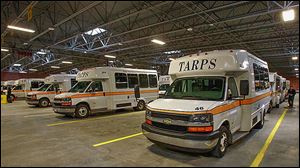
TARPS’ drop-offs criticized
Daughter says mom wandered away twice at end of trips
1/20/2014
A TARPS official said a driver has been reprimanded and the second incident is being investigated. He called such occurrences very rare and said the last were ‘three or four years ago.’
Twice since Thanksgiving, Sheila Bennett’s mother has wandered off after the end of a trip on the Toledo Area Regional Paratransit Service.
The first time, a neighbor found Rubbie (pronounced Ruby) Baldwin, who has Alzheimer’s disease, walking around a few doors down the street from Mrs. Bennett’s Old West End home on the Friday after the holiday.
The second time, last Monday, staff at the Lutheran Home on Seaman Street found Mrs. Baldwin roaming their facility’s halls when she was supposed to have been dropped off at the Alzheimer’s Association Adult Day Center next door on Wheeling Street.
While both incidents ended up with Mrs. Baldwin being brought back to where she belonged, Mrs. Bennett worries that if there is a next time, the ending might not be happy.
“The drivers are not ensuring proper delivery,” she said. “Two times within six weeks is not secure.”
Jon Elston, who as the Toledo Area Regional Transit Authority’s director of paratransit services oversees TARPS, said a driver has been reprimanded in the first case, while the second remained under investigation as of Friday. Overall, he said, such incidents are extremely rare, even though 57 percent of TARPS’ client list is flagged in agency records as having some degree of cognitive disability.
The only previous incidents with dementia patients wandering off since TARTA took over direct management of its paratransit service in 2008 — instead of using contractors — involved some people traveling to an Alzheimer’s Association day center on Reynolds Road “three or four years ago,” Mr. Elston said.
TARPS and the day center established a procedure there for TARPS drivers to sign their riders in during drop-offs, he said.
The day center on Wheeling occupies a suite in the same complex as the Lutheran Home, Mr. Elston said, “so the driver may not have picked the proper entrance” when delivering Mrs. Baldwin to her Monday appointment.
Sally Bollin, the Alzheimer’s Association’s executive director in Toledo, said the Wheeling center also has a sign-in procedure for its clients.
“Safety is one of our top concerns,” Ms. Bollin said.
In the Nov. 29 incident, Mr. Elston said, videotape from the bus shows Mrs. Baldwin was dropped off in front of Mrs. Bennett’s house, but began walking in the wrong direction. The driver got out and tried to redirect her verbally without success, the TARPS director said.
The driver, a two-year paratransit-service employee, should have walked her up to the door in the first place, Mr. Elston said. Because of a superior work record up to that point, he said, the driver was given a written warning rather than a suspension.
Transporting passengers with cognitive issues is challenging for drivers, Mr. Elston added, because they can be left briefly without supervision aboard buses while the drivers assist other passengers. They also can be quite resistant to directions, and drivers’ ability to force them to go where they’re supposed to go is limited.
TARPS provides free rides to companions for passengers who need assistance when riding the buses, but Mr. Elston said Mrs. Baldwin doesn’t use a “personal care attendant” for her trips.
No videotape of the more recent incident exists, Mr. Elston said.
Contact David Patch at: dpatch@theblade.com or 419-724-6094.